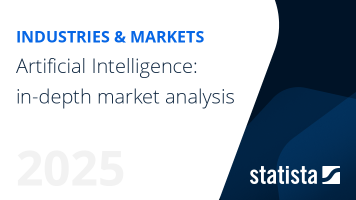Computer Vision - India
India- The market size in the Computer Vision market is projected to reach US$998.64m in 2025.
- The market size is expected to show an annual growth rate (CAGR 2025-2031) of 15.66%, resulting in a market volume of US$2.39bn by 2031.
- In global comparison, the largest market size will be United States (US$8.99bn in 2025).
Definition:
Computer vision is a field of artificial intelligence that focuses on enabling computers to understand and interpret visual information from digital images or videos. It involves the development of algorithms and models that can extract meaningful insights from visual data, such as identifying objects in images (image recognition), converting spoken language into written text (speech recognition), and analyzing unique facial features for identification (facial recognition). By mimicking human vision and perception, computer vision technology enables machines to comprehend and analyze visual content. This technology is applicable to a wide range of industries.
Structure:
The Computer Vision market has three markets. The Speech Recognition market covers the analysis and interpretation of human speech. The Image Recognition market covers the analysis and interpretation of digital images using computer vision, and the Facial Recognition covers the analysis and interpretation of human faces in digital images and/or videos.
Additional Information:
The market comprises two key performance indicators: market sizes and market sizes by industry. Market sizes are generated by the funding amount of Computer Vision companies. Key players of the market include companies such as Nvidia, Intel, and IBM.
For more information on the data displayed, use the info button right next to the boxes.
- Applications of computer vision to enable machines to interpret and analyze visual data, such as image and video recognition, autonomous vehicles, and medical imaging.
- Non-artificial intelligence applications of computer vision, such as video processing and editing, which do not involve machine learning or pattern recognition.








